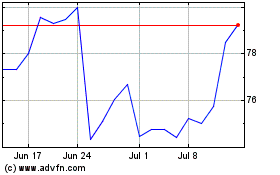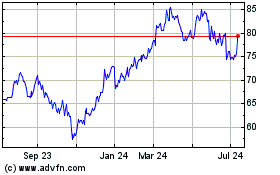Johnson Controls Inc. is set to become the latest American
company to move abroad in search of tax savings—and to do so on the
coattails of the dismantled Tyco empire.
Johnson Controls, an industrial-systems and battery maker whose
Milwaukee roots stretch back to 1885, said Monday it will merge
with Tyco International PLC and take on Tyco's Irish tax address.
The deal, valued at roughly $14.4 billion, is a so-called inversion
that should allow Johnson Controls to lower its tax rate over
time.
The merger—the first fresh megadeal of 2016—highlights the
self-perpetuating nature of inversions, as American companies that
move their legal homes abroad create opportunities for others to
follow. Those deals, in turn, further challenge U.S. regulators
trying to stanch the exodus of tax dollars overseas.
Tyco was an early expat, decamping first to Bermuda in 1997 and
finally settling in Ireland. Over the years, it spawned a crop of
spinoffs and subsidiaries that inherited one of Tyco's most
valuable assets: its foreign tax address. When M&A activity
rebounded after the financial crisis, those new firms became major
players in a wave of cross-border, tax-lowering deals, enabling
American companies with about $70 billion in annual revenue to slip
out of the U.S. tax net.
Tyco paid 12% of its profit in taxes over the past three years,
versus an average 29% by Johnson Controls, according to S&P
Capital IQ. Johnson Controls said its effective tax rate before
certain items was around 19% over the past two years ended Sept.
30.
In some ways, Monday's deal has its roots in the accounting
scandal that rocked Tyco more than a decade ago. After CEO Dennis
Kozlowski's conviction, breakup artist Edward Breen took over with
a mandate to pare Tyco's sprawling empire, which at the time
included everything from pharmaceuticals to burglar alarms. Many of
the resulting offshoots have become targets for U.S. companies
seeking inversion partners, while others have used their lower tax
rates to become consolidators, buying U.S. assets—which on average
pay higher rates—and squeezing tax savings that way. In 2012, Tyco
sold its pump-and-filter business to Pentair PLC, an inversion that
moved the U.S.-based company abroad. Last summer, Pentair bought
U.S.-based Erico Global for $1.8 billion.
Tyco's health-care business was eventually hived off into two
new companies, both of which have enabled tax-lowering
combinations. A more than $40 billion takeover of Covidien PLC,
which housed Tyco's medical-device business, allowed U.S.-based
Medtronic Inc. to invert last year.
Meanwhile, Mallinckrodt PLC, Tyco's legacy pharmaceuticals arm,
has used its lower tax rate to advantage as an acquirer. In its 2½
years as a stand-alone company, Mallinckrodt has spent nearly $11
billion on takeovers of higher-taxed U.S. drug assets.
Monday's deal also underscores the snowball effect of
inversions. As such deals pile up in a particular industry, they
enable more—and—bigger companies to follow suit. That is because
U.S. rules require foreign targets to be of a certain size relative
to their buyers.
Witness what happened in the pharmaceutical industry. In 2013, a
New-Jersey based drug company called Watson Pharmaceuticals
inverted by buying a small Irish rival. After a series of deals,
the resulting company—Allergan PLC, with a $117 billion market
value—is big enough to serve as the inversion partner for Pfizer
Inc., in what would be the largest corporate expatriation ever. The
deal is pending.
And if a combined Pfizer-Allergan spins off its generics
business, as is widely expected, it would create a potential
inversion partner for a host of big U.S. drugmakers.
The Johnson Controls-Tyco deal is at least the 12th inversion
pursued by American companies since the U.S. Department of the
Treasury moved in September 2014 to curb these deals, according to
a Wall Street Journal review. That is roughly the same number in
the 16 months before the move.
"This is yet another example of why we need tax reform to keep
our employers and jobs in America, rather than encouraging them to
move overseas," said House Speaker Paul Ryan (R., Wis.), who has
pushed for a tax overhaul that would, among other changes, lower
the rates U.S. companies pay. Johnson Controls is the largest
public company based in Mr. Ryan's home state of Wisconsin. The
company was founded 131 years ago by a Milwaukee professor who had
received a patent for the first electric thermostat.
The deal is likely to reignite a campaign-trail debate. Sen.
Bernie Sanders, a Democratic presidential candidate said the deal
would be "a disaster for American taxpayers" and denounced
"corporate deserters."
Johnson Controls and Tyco structured their deal to reap maximum
tax benefits. By giving Johnson Controls investors less than 60%
ownership of the combined company, they sidestep regulations aimed
at more-lopsided combinations that might have made the deal less
attractive.
"Below 60 [%] is the Holy Grail of inversion planning," said
Omri Marian, a tax law professor at the University of California,
Irvine.
Inversions let U.S. companies lower their tax rates over time by
giving them ways to shift profit out of the U.S. and move cash
easily from low-tax jurisdictions back to shareholders.
Johnson Controls Chief Executive Alex Molinaroli said the merger
wasn't tax-driven and pointed to the roughly $500 million in annual
savings expected to be wrung from combining the businesses. But, he
said in an interview Monday, "we definitely get some benefits, so
we'll take those benefits."
Back to 1997, when Tyco moved to Bermuda by acquiring
home-security firm ADT, it was one of the earliest inversions.
After Bermuda came under fire as a tax haven, the company moved in
2008 to Switzerland, and to Ireland in 2014, after Switzerland
enacted tougher rules around CEO pay and corporate governance.
Just last week, Tyco settled a long-running dispute with the
Internal Revenue Service for up to $525 million, far less than the
government had sought. That controversy stemmed from what's known
as earnings stripping, the practice of using internal company
transactions to concentrate tax deductions in the U.S. and profit
in low-tax countries.
Dana Mattioli contributed to this article.
Write to Liz Hoffman at liz.hoffman@wsj.com and Richard Rubin at
richard.rubin@wsj.com
(END) Dow Jones Newswires
January 25, 2016 20:15 ET (01:15 GMT)
Copyright (c) 2016 Dow Jones & Company, Inc.
Pentair (NYSE:PNR)
Historical Stock Chart
From Mar 2024 to Apr 2024

Pentair (NYSE:PNR)
Historical Stock Chart
From Apr 2023 to Apr 2024
